Daily Word of Grace for December 2020. Current postings of Daily Word of Grace can be found at the upper level of the page. Here is a link to see the current postings.
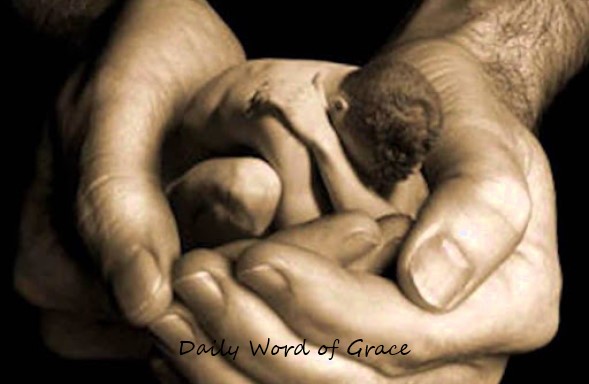
Daily Word of Grace # 207 (December 31, 2020)
As you reflect on the past year what stands out to you? What happened this past year that changed your life—positively or negatively? What were some of the high points or milestones of this past year? What were some of the low points or unexpected challenges? What were some unexpected and undeserved blessings? Which relationships in your life grew closer, which grew more distant? In what ways did you succeed this year? In what ways did you fail? No matter what has happened in your life this past year, you can commend it—all of it, every single aspect of it—to the mercy and grace of the Lord. The psalmist put it this way, “I trust in you, O Lord; I say, You are my God. My times are in your hand” (Psalm 31:14-15). Not only are your times in the Lord’s hands—including this past year and next year and every year—but you yourself are in the Lord’s hands (Isaiah 49:16). And even if this past year has included some failures on your part (mine has), the Lord still holds your times and your very self in his hands—and as the late Brennan Manning put it, “If I’ve learned anything about the world of grace, it’s that failure is always a chance for a do-over” (All is Grace 162). This means that this year, next year, every year, and at all times we can give thanks to the Lord.
Love and Prayers,
Dave
Daily Word of Grace # 206 (December 30, 2020)
In his brilliant 1960 book The Four Loves the incomparable C. S. Lewis describes in detail four different Greek words for love: storge (affection), philia (friendship), eros (romantic love), and agape (charity). The Greek word translated “love” most frequently in the New Testament is agape (charity). Agape love is self-sacrificial, completely focused on other people. And as Lewis writes, agape love is also vulnerable: “To love at all is to be vulnerable. Love anything, and your heart will certainly be wrung and possibly be broken. If you want to make sure of keeping it intact, you must give your heart to no one…Wrap it carefully round with hobbies and little luxuries; avoid all entanglements; lock it up safe in the casket or coffin of your selfishness. But in that casket—safe, dark, motionless, airless—it will change. It will not be broken; it will become unbreakable” (121). Every one of us has experienced the vulnerability of loving someone else with agape love, and therefore experienced the wound of heartbreak—and yet we love anyway. God’s love for the world and for you is the most vulnerable of all, a love so unconditional that it led to Jesus dying for love of you in the most vulnerable way imaginable on the cross. That is what agape love looks like, which is why the one disciple who stood at the foot of the cross, John, wrote, “We know love by this, that Jesus laid down his life for us—and we ought to lay down our lives for one another” (1 John 3:16).
Love and Prayers,
Dave
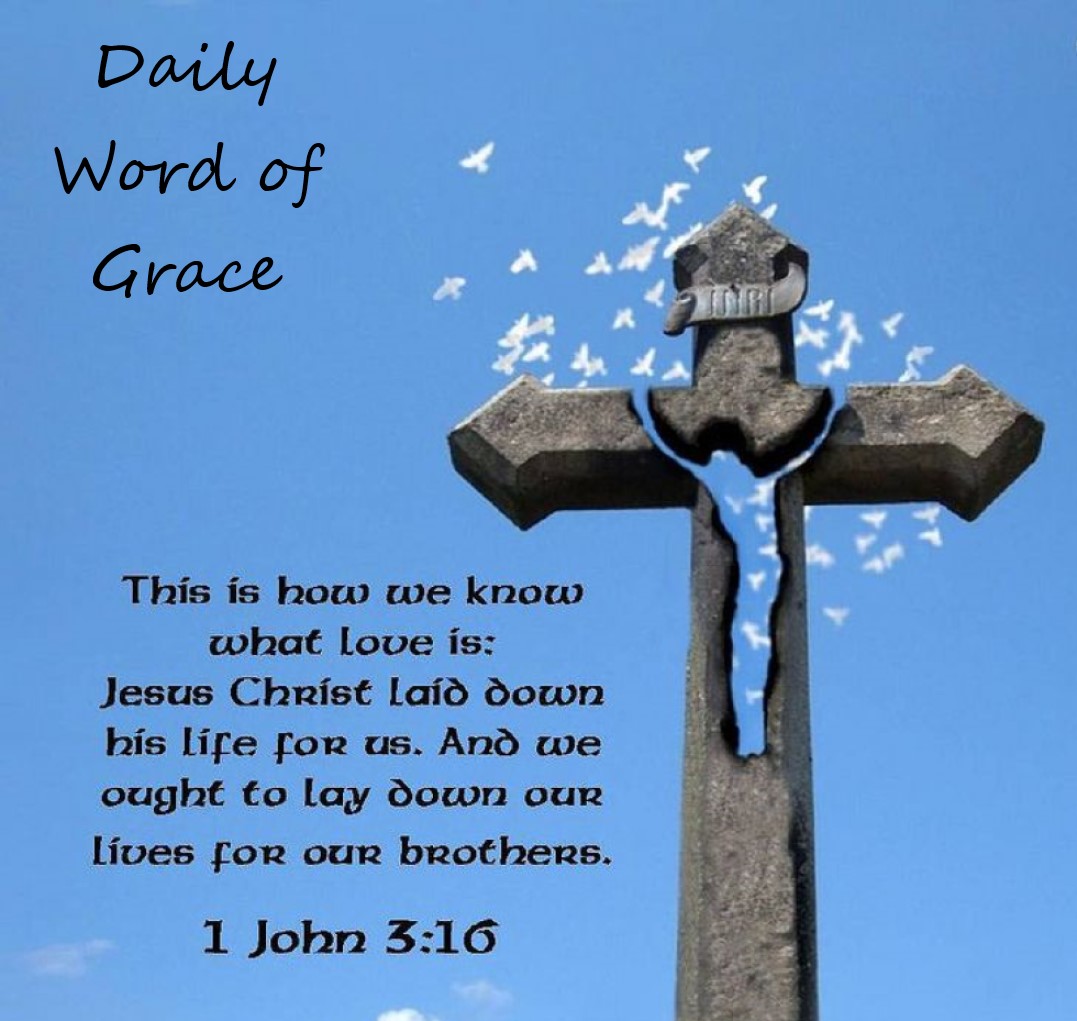
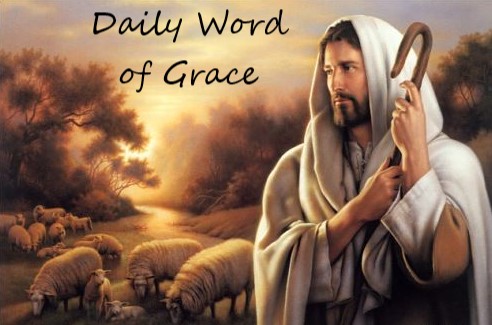
Daily Word of Grace # 205 (December 29, 2020)
In his poem “Michael: A Pastoral Poem” the English Romantic poet William Wordsworth (1770-1850) wrote, “There is a comfort in the strength of love; ‘Twill make a thing endurable, which else would overset the brain, or break the heart: I have conversed with more than one who well remember the old Man, and what he was years after he had heard this heavy news. His bodily frame had been from youth to age of an unusual strength. Among the rocks he went, and still looked up to sun and cloud, and listened to the wind; and as before, performed all kinds of labor for his sheep.” This is certainly the case with the love of God in Jesus Christ, who himself said, “I am the good shepherd. The good shepherd lays down his life for the sheep” (John 10:11). The strength of the love of God in Jesus Christ the Good Shepherd can indeed bring comfort, and is stronger than anything in your life that may overset your brain or break your heart. Jesus Christ your Good Shepherd is with you as you roam among the rocks in your life and even now continues to perform “all kinds of labor for his sheep”…including you. The love of Jesus Christ your Good Shepherd is good news that transcends and overcomes all the “heavy news” you will hear over the course of your life, now and always.
Love and Prayers,
Dave
Daily Word of Grace # 204 (December 28, 2020)
One of the most important events of the entire Bible was the Lord’s call to Abram, whose name the Lord later changed to Abraham. He was wealthy, established, elderly and secure. And yet the Lord still called him, “Now the Lord said to Abram, ‘Go from your country and your kindred and your father’s house to the land that I will show you. I will make of you a great nation, and I will bless you, and make your name great, so that you will be a blessing. I will bless those who bless you, and the one who curses you I will curse; and in you all the families of the earth shall be blessed’” (Genesis 12:1-3). And Abram responded to that call from the Lord, and left everything behind him not even knowing where he was going, knowing only that it was a place the Lord would later show him. But Abraham went anyway because although he did not know where he was going he knew Whom he was following—and indeed through Abraham God blessed “all the families of the earth.” Throughout his earthly ministry Jesus similarly called people to leave things behind and follow him (Matthew 3:18-22) and later proclaimed, “If any want to become my followers, let them deny themselves and take up their cross and follow me. For those who want to save their life will lose it, and those who lose their life for my sake will find it” (Matthew 16:24-25). Like Abraham, you may not know where the Lord is leading you, but knowing Whom you are following is enough.
Love and Prayers,
Dave


Daily Word of Grace # 203 (December 24, 2020)
One of the most powerful, high octane gospel Christmas hymns is “O Holy Night”, the mid-nineteenth century masterpiece by Adolphe Adam and Placide Cappeau. You know these lyrics: “Oh holy night. The stars are brightly shining. It is the night of our dear Savior’s birth. Long lay the world in sin and error, pining till He appeared and the soul felt its worth. A thrill of hope, the weary world rejoices, for yonder breaks a new and glorious morn. Fall on your knees. Oh, hear the angel voices. Oh night divine, oh night when Christ was born.” As the world was “in sin and error pining” God’s love proved so strong that he sent his Son, Jesus Christ. And throughout his earthly ministry Jesus reached out to the least, the last, and the lost with unconditional love, unconditional grace, unconditional forgiveness so that indeed “the soul felt its worth.” God’s love, grace and forgiveness in Jesus Christ spark “a thrill of hope” in our hearts—so that indeed “the weary world rejoices” and indeed “yonder breaks a new and glorious morn” because the mercies of God are “new every morning” (Lamentations 3:23). The same stars that were “brightly shining” the night of our dear Savior’s birth are still “brightly shining”, and the grace of God in Jesus Christ, the Light of the World (John 8:12), still shines on you even now. Merry Christmas!
Love and Prayers,
Dave
Daily Word of Grace # 202 (December 23, 2020)
Have you ever noticed that you are given the best Christmas gifts from those who know you the best and love you the most? Those who really know you and really love you tend to give you gifts that mean the most to you, gifts that you are thrilled to receive. The gospel works the same way. The One who knows you best is the Lord, who has known you from the foundations of the earth and knit you together in your mother’s womb (Psalm 139:13), who knows every desire of your heart (Psalm 37:4), and who sympathizes with your weaknesses (Hebrews 4:15). And the One who loves you the most is the Lord, who “proves his love for us in that while we still were sinners Christ died for us” (Romans 5:8), the most unconditional and immeasurable love ever as Jesus assured his disciples at the Last Supper, “No one has greater love than this, to lay down one’s life for one’s friends” (John 15:13). The Lord is “the Father of lights” who alone gives us “every perfect gift,” and the Ultimate Gift from the Ultimate Giver is none other than his Son Jesus Christ, who was given by the One who really knows you and really loves you, the One who always has and always will know you the best and love you the most.
Love and Prayers,
Dave
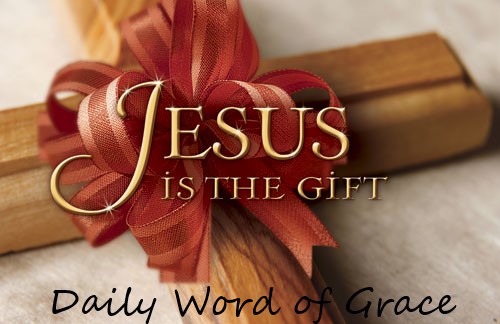
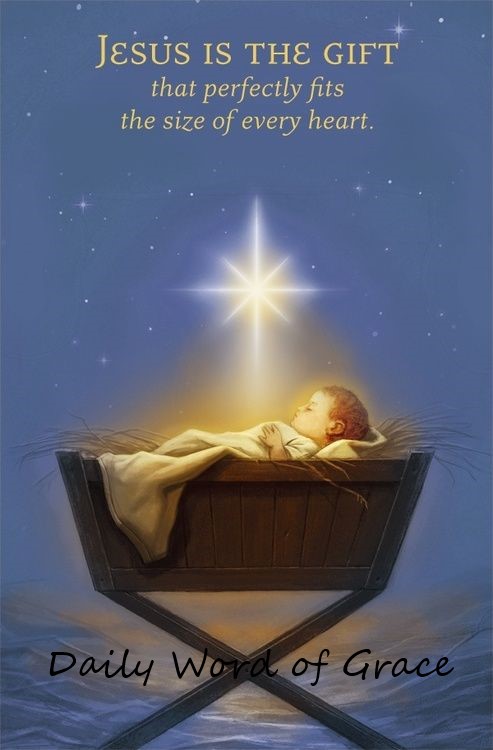
Daily Word of Grace # 201 (December 22, 2020)
When it comes to his Christmas stories, Charles Dickens is best known for his 1843 masterpiece novella A Christmas Carol, and rightly so. But in 1851 he published his brief and beautiful reflection What Christmas Is as We Grow Older. As some people grow older they grow more disillusioned and cynical, especially around Christmastime. And yet Dickens responds to this with words of hope and restoration: “Therefore, as we grow older, let us be more thankful that the circle of our Christmas associations and of the lessons that they bring, expands! Let us welcome every one of them, and summon them to take their places by the Christmas hearth. Welcome, old aspirations, glittering creatures of an ardent fancy, to your shelter underneath the holly! We know, and have not outlived you yet. Welcome, old projects and old loves, however fleeting, to your nooks among the steadier lights that burn around us. Welcome all that was ever real to our hearts; and to the earnestness that made you real, thanks to Heaven!” In other words, Christmastime serves as a reminder that yes, God is real; yes, Christ our Savior has been born; and yes, God has been and will always be the One who “was ever real to our hearts” and the One who remains in the process of “making all things new” (Revelation 21:5).
Love and Prayers,
Dave
Daily Word of Grace # 200 (December 21, 2020)
One of the lesser known works of H. G. Wells (1866-1946) “the father of science fiction” is his 1910 novel The Sleeper Wakes. In this novel a Londoner named Graham sleeps for two centuries, and awakens in transformed London. Graham has inherited a vast fortune from a trust that had been accruing value all that time, as well as vast power as he, the famous Sleeper, who had finally awakened. And yet, Graham remains as disillusioned as he had ever been, as Wells wrote: “To what end had he awakened, what was there for him to do? Humanity was spread below him like a map. He thought of the millions and millions of humanity following each other unceasingly for ever out of the darkness of non-existence into the darkness of death. To what end? Aim there must be, but it transcended his power of thought. He saw for the first time clearly his own infinite littleness, saw stark and terrible the tragic contrast of human strength and the craving of the human heart…And suddenly his littleness was intolerable, and there came to him an irresistible impulse to pray. And he prayed.” That is the exact place where the good news of the gospel meets us, for in Jesus Christ humanity is brought from darkness to light. God’s love in Jesus Christ transcends both our “infinite littleness” and “the tragic contrast of human strength and the craving of the human heart” and awakens the Sleeper within each of us to the reality of that love.
Love and Prayers,
Dave


Daily Word of Grace # 199 (December 18, 2020)
In his 2011 book Falling Upward: A Spirituality for the Two Halves of Life, Richard Rohr, a Franciscan friar, insightfully and incisively writes: “We seem to be our own worst enemies, and we forget or deny things that are just too good to be true. The ego clearly prefers an economy of merit, where we can divide the world into winners and losers, to any economy of grace, where merit or worthiness loses all meaning. In the first case, at least a few of us good guys attain glory. In the second case, all the glory is to God” (104). Indeed, at times we are our own worst enemies (or at least I will admit that is true for me). We do live in a world that, like our ego, “prefers an economy of merit” and naturally divides itself into “winners and losers”—or as Bruce Springsteen puts it in his song “Atlantic City”, “Down here it’s just winners and losers, and don’t get caught on the wrong side of that line.” The gospel does seem too good to be true—that God loves us more than we could ever imagine, that God’s love for us is all-knowing and all-forgiving, that God’s love defies any and all attempts to measure it, that God’s love is eternal, that God loves us so much he thought we were worth dying for. And yet all of this is true because thankfully God does not operate in “an economy of merit” but rather in “an economy of grace.” That is the good news of the gospel for all of us, winners and losers and everyone else. Only God can do all this and so Richard Rohr is exactly right when he observes, “all the glory is to God”, or as the psalmist wrote, “Not to us, O Lord, not to us, but to your name give glory” (Psalm 115:1).
Love and Prayers,
Dave
Daily Word of Grace # 198 (December 17, 2020)
One of my favorite poets is John Donne (1572-1631) who is not only one of England’s greatest poets but was also a priest. In his poem “A Hymn to God the Father” he writes about his need for God’s forgiveness: “Wilt thou forgive that sin where I begun, which was my sin, though it were done before? Wilt thou forgive that sin, through which I run, and do run still, though still I do deplore? When thou hast done, thou hast not done, for I have more.” In the second stanza he acknowledges not only our proclivity to sin, but also its ripple effects: “Wilt thou forgive that sin which I have won others to sin, and made my sin their door? Wilt thou forgive that sin which I did shun a year or two, but wallowed in a score? When thou hast done, thou hast not done, for I have more.” In the third and final stanza he appeals to God’s eternal mercy: “I have a sin of fear, that when I have spun my last thread, I shall perish on the shore. But swear by thyself, that at my death thy Son shall shine as he shines now, and heretofore; and, having done that, thou hast done; I fear no more.” This is brilliant and moving portrayal of the comprehensiveness of God’s forgiving love, a forgiving love we all need all the time, just like John Donne. God’s forgiving love casts out fear (1 John 4:18), so that even at the hour of death when we “shall perish on the shore” we can echo John Donne, “I fear no more.”
Love and Prayers,
Dave
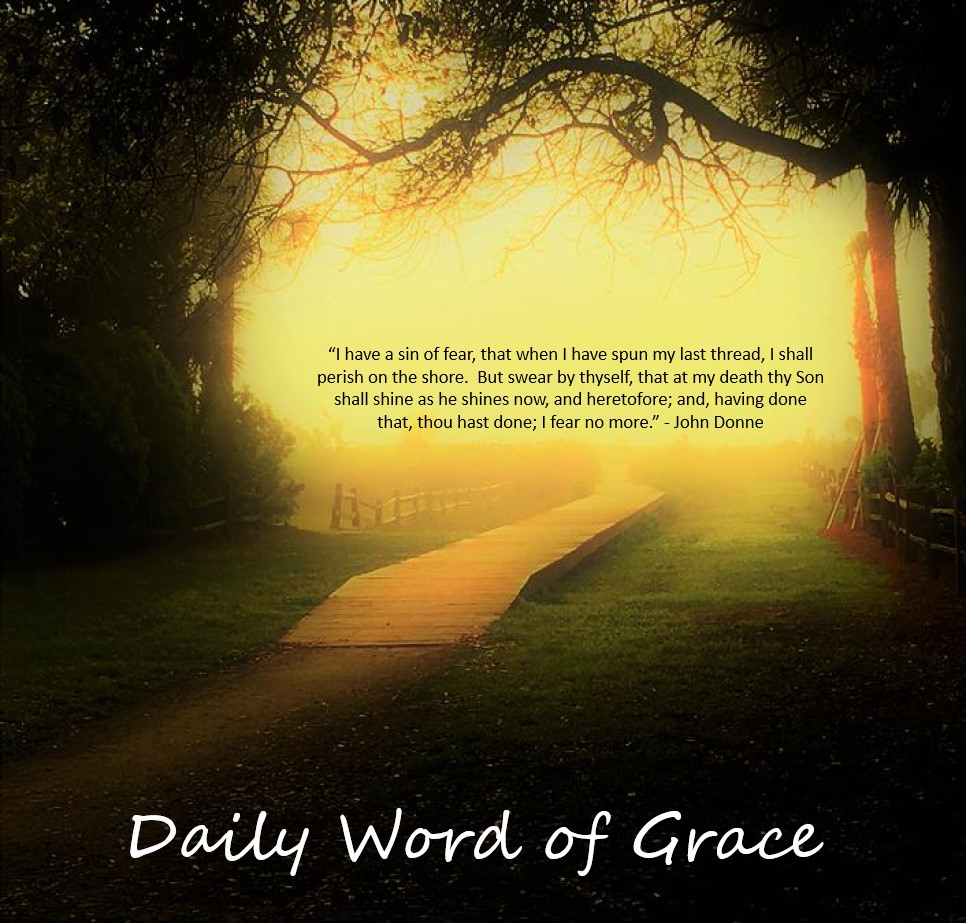

Daily Word of Grace # 197 (December 16, 2020)
Near the beginning of his Letter to the Ephesians the Apostle Paul is effusive about the innumerable blessings God has given us in Jesus Christ: “Blessed be the God and Father of our Lord Jesus Christ, who has blessed us in Christ with every spiritual blessing in the heavenly places, just as he chose us in Christ before the foundation of the world to be holy and blameless before him in love. He destined us for adoption as his children through Jesus Christ, according to the good pleasure of his will, to the praise of his glorious grace that he freely bestowed on us in the Beloved. In him we have redemption through his blood, the forgiveness of our trespasses, according to the riches of his grace that he lavished on us” (Ephesians 1:3-8). What was true for the Ephesians is true for you. God has chosen you and destined you for adoption as one of his beloved children. Why? Because God wanted to, or as Paul put it, “according to the good pleasure of his will.” Through Jesus Christ God has freely bestowed upon you grace, redeemed you through Jesus’ blood shed on the cross, and forgiven you your trespasses…all “according to the riches of his grace that he lavished on us.” When it comes to giving you grace, God is not stingy or miserly, but overwhelmingly generous. In Jesus Christ God has not just given you a tiny bit of grace, but has “lavished” you with grace—and still does.
Love and Prayers,
Dave
Daily Word of Grace # 196 (December 15, 2020)
Two of the central themes of our lives (and of almost every great novel, poem, song and play) are love and death. Along these lines, a particularly moving song from the Broadway musical smash Hamilton is “Wait for It” in which Aaron Burr (played by Leslie Odom, Jr.) sings about love: “Love doesn’t discriminate between the sinners and the saints. It takes and it takes and it takes and we keep loving anyway. We laugh and we cry and we break and we make our mistakes. And if there’s a reason I’m by her side when so many have tried, then I’m willing to wait for it. I’m willing to wait for it.” Later in this song he sings about death: “Death doesn’t discriminate between the sinners and the saints. It takes and it takes and it takes and we keep living anyway. We rise and we fall and we break and we make our mistakes. And if there’s a reason I’m still alive when everyone who loves me has died, I’m willing to wait for it. I’m willing to wait for it.” Love and death are at the center of the gospel as well—the love of God for the world (including you) and the definitive expression of that love in the death of Jesus Christ on the cross for all of us, “sinners and saints” (Romans 5:8). God’s love meets us in every situation—when “we laugh and we cry and we break and we make our mistakes” and when “we rise and we fall and we break and we make our mistakes.” No matter what, God will always “keep loving anyway”—and you never need to wait for it.
Love and Prayers,
Dave
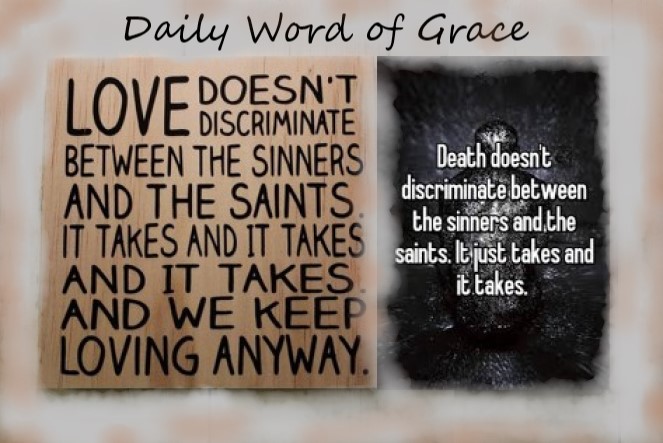

Daily Word of Grace # 195 (December 14, 2020)
I have always been a fan of Simon and Garfunkel, whose albums made many a rotation on my parents’ record player when I was very young. Their 1968 album Bookends has a poignant and beautiful song called “America” about a couple traveling together on a bus—“Laughing on the bus, playing games with the faces. She said the man in the gabardine suit was a spy. I said, be careful, his bowtie is really a camera. Toss me a cigarette, I think there’s one in my raincoat. We smoked the last one an hour ago. So I looked at the scenery. She read her magazine. And the moon rose over an open field.” Then in the final verse he sings about why they are on the bus ride together in the first place: “Cathy, I’m lost, I said though I knew she was sleeping. I’m empty and aching and I don’t know why. Counting the cars on the New Jersey Turnpike. They’ve all come to look for America, all come to look for America, all come to look for America.” You can know what bus you are on, know who you are riding the bus with, and even know the destination of that bus—and yet still feel lost, be “empty and aching” and not know why, still looking for something—whether that something is America or something else. The grace of God meets you right there. Jesus seeks and saves the lost (Luke 19:10). This means Jesus is on the bus with you, to offer love for your empty places and compassion for your aching places.
Love and Prayers,
Dave
Daily Word of Grace # 194 (December 11, 2020)
Several years ago I visited the Hank Williams Museum in Montgomery, Alabama. Hank Williams (1923–1953) was undoubtedly one of the most influential singer-songwriters of the 20th century. His hits like “Move It On Over”, “I’m So Lonesome I Could Cry”, and “Hey Good Lookin’” are still classics. One of his biggest hits was “I Saw the Light” in which he described his conversion to Jesus Christ: “I wandered so aimless, life filled with sin. I wouldn’t let my dear savior in. Then Jesus came like a stranger in the night. Praise the Lord I saw the light. I saw the light, I saw the light, no more darkness, no more night. Now I’m so happy, no sorrow in sight. Praise the Lord I saw the light. Just like a blind man I wandered along. Worries and fears I claimed for my own. Then like the blind man that God gave back his sight. Praise the Lord I saw the light.” It’s a simple, beautiful, straightforward song about what can happen when someone lost in the darkness of sin experiences the real light of God’s real love. Tragically Hank Williams died when he was only 29, but on his gravestone at Oakwood Cemetery in Montgomery is engraved: “PRAISE THE LORD. I SAW THE LIGHT”—and Jesus remains “the light of the world” (John 8:12).
Love and Prayers,
Dave
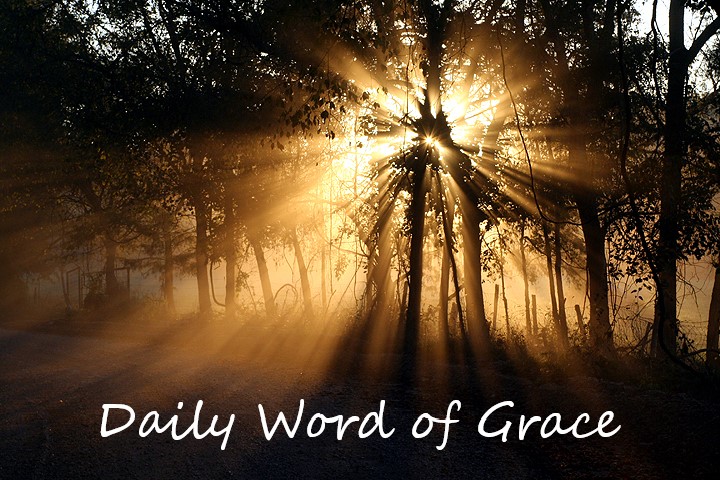
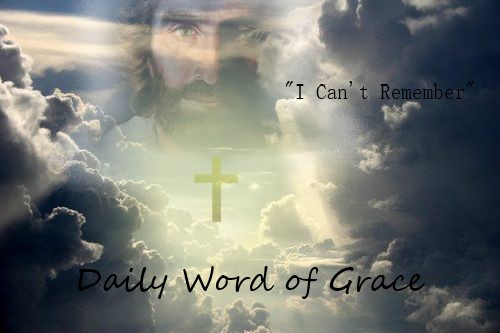
Daily Word of Grace # 193 (December 10, 2020)
In his 1990 book The Ragamuffin Gospel the late preacher and writer Brennan Manning tells a story about a Catholic woman who had been having visions of Jesus. The local bishop was skeptical, and decided to meet with her. “Is it true, ma’am, that you have visions of Jesus?” he asked. She responded, “Yes.” The bishop continued, “Well, the next time you have a vision, I want you to ask Jesus to tell you the sins that I confessed in my last confession.” Ten days later the two of them met again, and the bishop asked, “Did you do what I asked?” “Yes, bishop, I asked Jesus to tell me the sins you confessed in your last confession.” The nervous bishop asked, “What did Jesus say?” She gently took his hand and replied, “Bishop, these are His exact words: ‘I can’t remember’” (118-119). That is what God’s forgiveness looks like. Scripture assures us God’s forgiveness is total, complete, and forever. God puts it this way, “I will be merciful toward their iniquities, and I will remember their sins no more” (Hebrews 8:12), or as the Old Testament prophet Micah wrote, “You will cast all our sins into the depths of the sea” (Micah 7:19). When it comes to remembering your sins, neither you nor anyone else has the last word. The last word belongs to Jesus, who chooses not to remember them.
Love and Prayers,
Dave
Daily Word of Grace # 192 (December 9, 2020)
Many people are restless—restless about their health or their job or their relationships or their life trajectory. You may be restless at this very moment. If so, you are in good company. Perhaps the most influential Church Father in the history of Christianity is St. Augustine (354-430), a faithful bishop, brilliant philosopher, and prolific scholar. One of his most famous books is his Confessions, which begins this way: “You are great, Lord, and highly to be praised (Ps. 47:2): great is your power and your wisdom is immeasurable (Ps. 146:5). Man, a little piece of your creation, desires to praise you, a human being ‘bearing his mortality with him’ (2 Cor. 4:10), carrying with him the witness of his sin and the witness that you ‘resist the proud’ (1 Pet. 5:5). Nevertheless, to praise you is the desire of man, a little piece of your creation. You stir man to take pleasure in praising you, because you have made us for yourself, and our heart is restless until it rests in you.” Jesus himself offers a gracious invitation to the restless: “Come to me, all you that are weary and are carrying heavy burdens, and I will give you rest” (Matthew 11:28). In other words, the gospel is good news because it points to One in whom the restless can always find rest.
Love and Prayers,
Dave


Daily Word of Grace # 191 (December 8, 2020)
The final song on U2’s 2004 album How to Dismantle an Atomic Bomb is “Yahweh,” a prayer of praise and surrender to God. Bono sings: “Take these shoes click-clacking down some dead end street. Take these shoes and make them fit. Take this shirt, polyester white trash made in nowhere. Take this shirt and make it clean, clean. Take this soul stranded in some skin and bones. Take this soul and make it sing, sing. Yahweh, Yahweh, always pain before a child is born. Yahweh, Yahweh, still, I’m waiting for the dawn.” “Yahweh” is an Old Testament names for God. The name “Jesus” actually means “Yahweh saves”—so that in Jesus Christ Yahweh indeed makes your shoes fit, cleans your shirt, and makes your stranded soul sing. The gospel is good news for those still dealing with “pain before the child is born” and good news for those still “waiting for the dawn.” For as we will celebrate anew this Christmas and sing in “Silent Night”, Jesus’ birth signifies the “dawn of redeeming grace” because “the grace of God has appeared, bringing salvation to all” (Titus 2:11)—including you.
Love and Prayers,
Dave
Daily Word of Grace # 190 (December 7, 2020)
In the 2019 fascinating documentary ZZ Top: That Little Ol’ Band from Texas a story is recounted about a concert they performed in their early days when they were on the road playing at bars, roadhouses, anywhere they could get a gig. At one concert there was only one person who showed up to hear them. Can you imagine that? ZZ Top had driven to the bar, set up all their equipment, tuned their instruments, completed the sound check…and only one person showed up. ZZ Top apologized to that one person and said they guessed they would cancel the concert…but that one person asked if they could please go ahead and play their whole set because he was so excited to see them. ZZ Top did just that—they played their entire concert, played their hearts out, for that one fan. And for many years afterwards that one fan kept showing up at many of their concerts, even when they hit the bigtime and began playing in large arenas and even stadiums. What that one fan did for ZZ Top—kept showing up even if he was the only one there; and what ZZ Top did for that one fan—played their hearts out even though he was the only one in the audience—is what Jesus does for you. Jesus always shows up, and Jesus always plays his heart out, even at the cost of his life, as on Good Friday. What Jesus did for the whole world, Jesus would have done for only you. In response to such committed love we can “sing a new song to the Lord” (Psalm 96:1).
Love and Prayers,
Dave
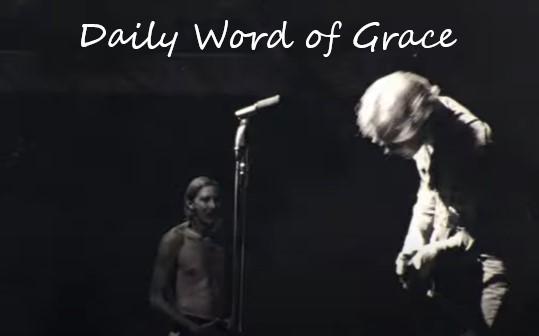
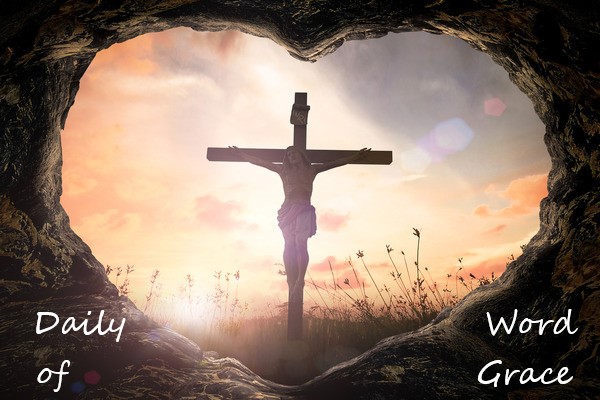
Daily Word of Grace # 189 (December 4, 2020)
More often than not human motives are mixed. Once in a while we may do something kind for someone else with a genuine motivation of love—but more often than not there are other ingredients mixed into our motives—traces of grandstanding or self-interest, ulterior motives of which we may not even be aware, some kind of strings attached, some kind of catch. And we can detect these mixed motives in others too, usually the same mixed motives that lurk within ourselves (so annoying isn’t it?). But when it comes to God, the one and only motivation is love because “God is love” (1 John 4:8 and 16). The one and only motive for Jesus’ incarnation, death, and resurrection is God’s love, as Jesus himself famously told a Pharisee named Nicodemus, “God so loved the world that he gave his only Son, so that everyone who believes in him may not perish but may have eternal life” (John 3:16). God’s love for you has no mixed motives, no grandstanding, no self-interest, no ulterior motives, no strings attached, no catch. And in response to this kind of love from God we are called to share that kind of love with others—or as the Apostle Paul put it, “Let love be genuine” (Romans 12:9). The paramount motivation is always love.
Love and Prayers,
Dave
Daily Word of Grace # 188 (December 3, 2020)
The late author and educator Stephen Covey is best known for his international 1989 bestseller The 7 Habits of Highly Successful People. One of his most famous maxims is “the main is to keep the main thing the main thing.” This is certainly the case when it comes to the gospel of God’s unconditional love. God loves all of us unconditionally regardless of whether we are considered “highly successful” or “highly unsuccessful.” Speaking for myself, it has often been the times when I have been highly unsuccessful when God’s love has been the most palpable. The definitive expression of God’s unconditional love is the death of Jesus Christ on the cross to atone for the sins of the world and open the gate to everlasting life. When it came to preaching this gospel the Apostle Paul certainly did so with a “the main thing is to keep the main thing the main thing” focus—as he wrote to the church at Corinth: “When I came to you, brothers and sisters, I did not come proclaiming the mystery of God to you in lofty words or wisdom. For I decided to know nothing among you except Jesus Christ, and him crucified” (1 Corinthians 2:1-2). His myopic focus on God’s unconditional love in Jesus Christ also marked his personal life: “I regard everything as loss because of the surpassing value of knowing Christ Jesus my Lord” (Philippians 3:8). Even when you are highly unsuccessful and unable “to keep the main thing the main thing”, God’s unconditional love remains the main thing, and always will.
Love and Prayers,
Dave


Daily Word of Grace # 187 (December 2, 2020)
My all-time favorite television show is The Office, starring Steve Carrell as Michael Scott the manager of the Scranton, Pennsylvania branch of the fictitious Dunder Mifflin Paper Company. Throughout the series he demonstrates repeatedly how, albeit with good intentions, he is often absolutely clueless. In the episode “Moroccan Christmas” (Season 5, episode 11) there is an intervention for Meredith, an alcoholic employee. This is how Michael Scott defines an intervention: “An intervention? It’s sort of hard to describe but really it’s a coming together, it’s a surprise party for people who have addictions. And you get in their face and you scream at them and you make them feel really badly about themselves, and then they stop.” It’s hilarious, but it is also sobering (pun intended) because of course an intervention is anything but a surprise party, because when you get in people’s faces and scream at them and make them feel bad about themselves (most people already feel bad about themselves) they do not stop their addictive behavior but rather dive even deeper into it. In his incarnation Jesus intervened on behalf of an addicted world. But Jesus never screamed in anyone’s faces. Jesus never tried to make people feel really badly about themselves. Instead, Jesus loved and forgave and healed and spoke words of life, and on Good Friday died to intervene for all of us. The truth is by our own efforts we cannot stop (whatever that addiction is), so God in Christ intervenes on our behalf and at this moment “indeed intercedes for us” (Romans 8:34)—and always will.
Love and Prayers,
Dave
Daily Word of Grace # 186 (December 1, 2020)
Several years ago I was driving across the desert in southern Utah on the way to an epic afternoon at Zion National Park. As I traversed the breathtaking scenery I listened to one of my favorite Bruce Springsteen albums, Darkness on the Edge of Town (1978), especially “The Promised Land” which is set in the Utah desert. This song describes a storm in the desert: “Well there’s a dark cloud rising from the desert floor. I packed mgs and I’m heading straight into the storm. Gonna be a twister to blow everything down that ain’t got the faith to stand its ground. Blow away the dreams that tear you apart. Blow away the dreams that break your heart. Blow away the lies that leave you nothing but lost and brokenhearted.” As foreboding as that verse is, in the chorus the Boss repeats a phrase of hope: “I believe in a promised land…I believe in a promised land…I believe in a promised land.” The gospel is about God being with you in the desert storm, about God being with you when a twister blows everything down, about God being with you when you have been wounded by “lies that leave you nothing but lost and brokenhearted.” In the same way God eventually brought the Israelites into the promised land, God will do so for you…because God’s love always wins the day.
Love and Prayers,
Dave
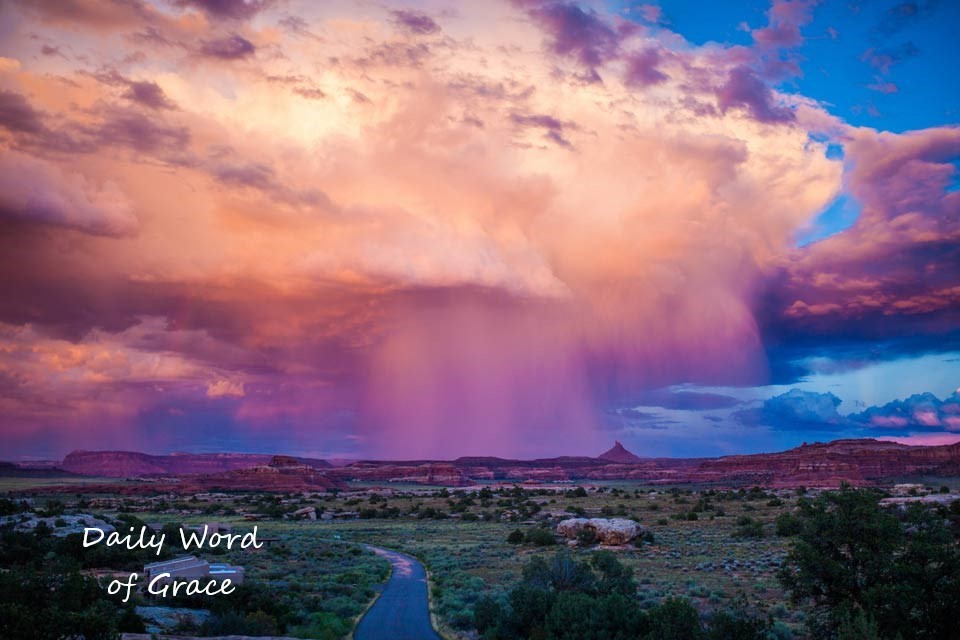
The rest of the Daily Word of Grace posts can be found on the Archive page.